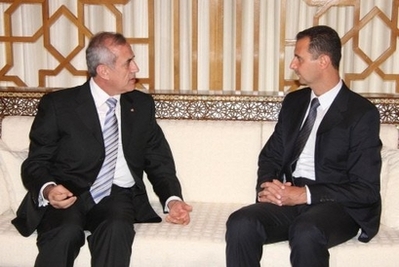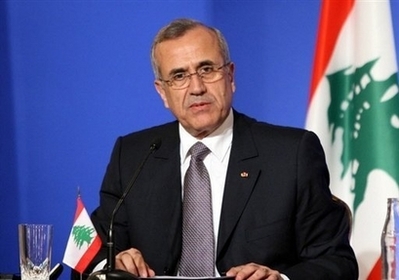 DAMASCUS (AFP) – Syria and Lebanon agreed on Thursday to take formal steps to demarcate their borders as part of a string of decisions to normalise their relations for the first time after decades of tension. The announcement came as President Michel Sleiman wrapped up a landmark two-day visit to Damascus — the first by a Lebanese president since Syria ended almost 30 years of military domination over Lebanon in April 2005. The two countries also pledged to examine the fate of hundreds of people missing since the 1975-1990 Lebanese civil war — amid claims by rights groups that around 650 people who vanished during the war are being held in Syria. Syrian foreign minister also has noted in a press conference that we need to differentiate between lebanese that has vanished and lebanese held in Syrian jail. In reagards of Lebanese detainees he has pointed that this will need a deal between the Ministry of Lebanese and Syrian Ministry of justice. Sleiman and Syrian President Bashar al-Assad also agreed to control their borders and curb "trafficking," Syrian Foreign Minister Walid Muallem and Lebanese counterpart Fawzi Salukh told a news conference. Assad and Sleiman agreed "on setting up diplomatic relations between the two countries at the level of ambassadors," the statement said, reiterating an announcement made at the start of Sleiman’s visit on Wednesday. Salukh said both countries will take steps next week to implement the decisions. The United States cautiously welcomed the establishment of diplomatic ties. "One of the steps that has long been required is the establishment of a proper embassy for Syria in Lebanon and vice versa," US Secretary of State Condoleezza Rice said on Wednesday. "Now, if the Syrians will go ahead and demarcate the border between Lebanon and Syria, and respect (Lebanon’s) sovereignty in other ways, then this will have proved to be a very good step," she added. UN Secretary General Ban Ki-moon noted "positively" the decision, his press office said. Lebanon and Syria said they agreed "to reactivate the work of the joint committee to demarcate the Lebanese-Syrian borders within a mechanism and a set of priorities" and would take Fariz Suaid, from the anti-Syrian "14th March group", said the summit yielded much less than expected. Syria, he suggested was not engaging fully in some issues"administrative and technical steps." the summit was welcomed by Hezbollah. Its leader, Sheikh Hassan Nasrallah, said the visit marked a qualitative change in the relationship.
DAMASCUS (AFP) – Syria and Lebanon agreed on Thursday to take formal steps to demarcate their borders as part of a string of decisions to normalise their relations for the first time after decades of tension. The announcement came as President Michel Sleiman wrapped up a landmark two-day visit to Damascus — the first by a Lebanese president since Syria ended almost 30 years of military domination over Lebanon in April 2005. The two countries also pledged to examine the fate of hundreds of people missing since the 1975-1990 Lebanese civil war — amid claims by rights groups that around 650 people who vanished during the war are being held in Syria. Syrian foreign minister also has noted in a press conference that we need to differentiate between lebanese that has vanished and lebanese held in Syrian jail. In reagards of Lebanese detainees he has pointed that this will need a deal between the Ministry of Lebanese and Syrian Ministry of justice. Sleiman and Syrian President Bashar al-Assad also agreed to control their borders and curb "trafficking," Syrian Foreign Minister Walid Muallem and Lebanese counterpart Fawzi Salukh told a news conference. Assad and Sleiman agreed "on setting up diplomatic relations between the two countries at the level of ambassadors," the statement said, reiterating an announcement made at the start of Sleiman’s visit on Wednesday. Salukh said both countries will take steps next week to implement the decisions. The United States cautiously welcomed the establishment of diplomatic ties. "One of the steps that has long been required is the establishment of a proper embassy for Syria in Lebanon and vice versa," US Secretary of State Condoleezza Rice said on Wednesday. "Now, if the Syrians will go ahead and demarcate the border between Lebanon and Syria, and respect (Lebanon’s) sovereignty in other ways, then this will have proved to be a very good step," she added. UN Secretary General Ban Ki-moon noted "positively" the decision, his press office said. Lebanon and Syria said they agreed "to reactivate the work of the joint committee to demarcate the Lebanese-Syrian borders within a mechanism and a set of priorities" and would take Fariz Suaid, from the anti-Syrian "14th March group", said the summit yielded much less than expected. Syria, he suggested was not engaging fully in some issues"administrative and technical steps." the summit was welcomed by Hezbollah. Its leader, Sheikh Hassan Nasrallah, said the visit marked a qualitative change in the relationship.

by Roueida Mabardi, DAMASCUS (AFP) – Lebanese President Michel Sleiman was heading to neighbouring Syria on Wednesday for landmark talks with his counterpart Bashar al-Assad aimed at establishing diplomatic relations for the first time. But hours before Sleiman was due to leave for the two-day visit, a bomb exploded in the northern port city of Tripoli, killing at least 18 people, nine of them soldiers, and wounding 40 others. The Syrian foreign ministry condemned the attack as a "criminal act" and expressed support for Lebanon "in the face of all those who are manipulating its security and stability." Syria’s official Tishrin newspaper hailed the summit and said it expected "past mistakes to be overcome… by establishing diplomatic relations" which it said must be based on "respect, friendship and coordination." Government newspaper Ath-Thawra said: "Syria will listen carefully to Michel Sleiman. There will be a dialogue capable of solving all pending issues." Syria and Lebanon have not had diplomatic ties since independence from French colonial power 60 years ago. Assad and Sleiman agreed to establish them during talks last month in Paris. Former army chief Sleiman is the first Lebanese president to visit Damascus since Syria withdrew its troops from Lebanon in April 2005 ending almost three decades of military domination of its "sister" nation.
Sleiman’s visit aims to redefine ties between Beirut and Damascus which have been on the decline since the Hariri murder. It comes a day after Beirut’s Western-backed national unity government won a much-delayed parliamentary vote of confidence after stormy debates among rival MPs on the thorny issue of weapons held by Hezbollah. The agenda in Damascus features prickly issues such as a border demarcation, a review of longstanding accords, Lebanese detainees in Syria and the presence of radical pro-Syrian Palestinian groups in Lebanon, diplomatic sources said. A Lebanese official said the opening of embassies will also top the agenda. Sleiman was elected in May as part of an agreement struck in Doha between the pro- and anti-Syrian camps in Lebanon after an 18-month political crisis which degenerated into deadly factional violence. The deal led to the formation of the new unity government, a development which would have been impossible without Syrian consent. "Syria wants a stable, united and Arab Lebanon which does not serve as a trampoline for hostile activities," Elias Murad, editor-in-chief of the ruling Baath party‘s newspaper, told AFP.



